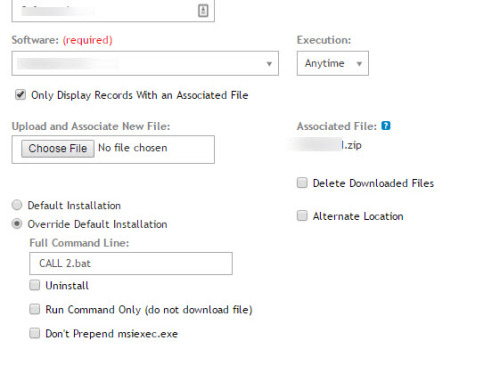Can I run a batch file in managed install quietly?

I've uploaded a zip file which includes 2 msi files and one bat file. I'm using Managed installed and calling the bat file as you can see in the screenshot. This works great except the command prompt stays open while it's installing the msi quietly. Is there a way to hide the Command prompt or run in it silently? I don't want users to close this while it's installing because this is an encryption program and both msi files have to install in order.
2 Comments
[ + ] Show comments
-
are you using start /wait in this batch? - SMal.tmcc 8 years ago
-
yes I am - sam240 8 years ago
Answers (2)
Please log in to answer
Posted by:
chucksteel
8 years ago
It should be silent but there are a couple of problems with your configuration.
It looks like you have a space in the batch file name, is it "call 2.bat" or call2.bat? I would remove the space.
You need to check the box for "Don't Prepend msiexec.exe", otherwise the appliance will actually try running msiexec.exe call2.bat, which won't work.
Comments:
-
I use bats in a few of my MI's and none of them show on our machines. Can you post the bat file? - SMal.tmcc 8 years ago
-
Chuck, batch file is called 2.bat so I'm calling 2.bat but here is what is inside the batch file. @echo off
@setlocal enableextensions
echo Starting Sophos PreInstall
start /wait msiexec.exe /i "%~dp0SGxClientPreinstall.msi" /quiet /passive /norestart
echo.
echo Starting Sophos Client Install
if "%ProgramFiles(x86)%" == "" goto on32bit
goto on64bit
:on32bit
start /wait msiexec.exe /i "%~dp0SGNClient_x32.msi" /quiet /passive /norestart
goto end
:on64bit
start /wait msiexec.exe /i "%~dp0SGNClient_x64.msi" /quiet /passive /norestart
goto end - sam240 8 years ago
Posted by:
SMal.tmcc
8 years ago
Thanks for posting your bat that is where the problem lies.
The start command is the culprit. When you use the start command is spawns a new cmd window, the 2.bat is suppressed from showing by Kace but any spawns are not. You can try to add the /B switch to see if that works or use /min switch.
If you have a k2000 you can also get the ksleep.exe from and add that to the zip and call that in between the msi's to force a wait without using start /wait
The start command is the culprit. When you use the start command is spawns a new cmd window, the 2.bat is suppressed from showing by Kace but any spawns are not. You can try to add the /B switch to see if that works or use /min switch.
C:\Users\start /?
Starts a separate window to run a specified program or command.
START ["title"] [/D path] [/I] [/MIN] [/MAX] [/SEPARATE | /SHARED]
[/LOW | /NORMAL | /HIGH | /REALTIME | /ABOVENORMAL | /BELOWNORMAL]
[/NODE <NUMA node>] [/AFFINITY <hex affinity mask>] [/WAIT] [/B]
[command/program] [parameters]
"title" Title to display in window title bar.
path Starting directory.
B Start application without creating a new window. The
application has ^C handling ignored. Unless the application
enables ^C processing, ^Break is the only way to interrupt
the application.
I The new environment will be the original environment passed
to the cmd.exe and not the current environment.
MIN Start window minimized.
MAX Start window maximized.
SEPARATE Start 16-bit Windows program in separate memory space.
SHARED Start 16-bit Windows program in shared memory space.
LOW Start application in the IDLE priority class.
NORMAL Start application in the NORMAL priority class.
HIGH Start application in the HIGH priority class.
REALTIME Start application in the REALTIME priority class.
ABOVENORMAL Start application in the ABOVENORMAL priority class.
BELOWNORMAL Start application in the BELOWNORMAL priority class.
NODE Specifies the preferred Non-Uniform Memory Architecture (NUMA)
node as a decimal integer.
AFFINITY Specifies the processor affinity mask as a hexadecimal number.
The process is restricted to running on these processors.
The affinity mask is interpreted differently when /AFFINITY and
/NODE are combined. Specify the affinity mask as if the NUMA
node's processor mask is right shifted to begin at bit zero.
The process is restricted to running on those processors in
common between the specified affinity mask and the NUMA node.
If no processors are in common, the process is restricted to
running on the specified NUMA node.
WAIT Start application and wait for it to terminate.
command/program
If it is an internal cmd command or a batch file then
the command processor is run with the /K switch to cmd.exe.
This means that the window will remain after the command
has been run.
If it is not an internal cmd command or batch file then
it is a program and will run as either a windowed application
or a console application.
parameters These are the parameters passed to the command/program.
NOTE: The SEPARATE and SHARED options are not supported on 64-bit platforms.
Specifying /NODE allows processes to be created in a way that leverages memory
locality on NUMA systems. For example, two processes that communicate with
each other heavily through shared memory can be created to share the same
preferred NUMA node in order to minimize memory latencies. They allocate
memory from the same NUMA node when possible, and they are free to run on
processors outside the specified node.
start /NODE 1 application1.exe
start /NODE 1 application2.exe
These two processes can be further constrained to run on specific processors
within the same NUMA node. In the following example, application1 runs on the
low-order two processors of the node, while application2 runs on the next two
processors of the node. This example assumes the specified node has at least
four logical processors. Note that the node number can be changed to any valid
node number for that computer without having to change the affinity mask.
start /NODE 1 /AFFINITY 0x3 application1.exe
start /NODE 1 /AFFINITY 0xc application2.exe
If Command Extensions are enabled, external command invocation
through the command line or the START command changes as follows:
non-executable files may be invoked through their file association just
by typing the name of the file as a command. (e.g. WORD.DOC would
launch the application associated with the .DOC file extension).
See the ASSOC and FTYPE commands for how to create these
associations from within a command script.
When executing an application that is a 32-bit GUI application, CMD.EXE
does not wait for the application to terminate before returning to
the command prompt. This new behavior does NOT occur if executing
within a command script.
When executing a command line whose first token is the string "CMD "
without an extension or path qualifier, then "CMD" is replaced with
the value of the COMSPEC variable. This prevents picking up CMD.EXE
from the current directory.
When executing a command line whose first token does NOT contain an
extension, then CMD.EXE uses the value of the PATHEXT
environment variable to determine which extensions to look for
and in what order. The default value for the PATHEXT variable
is:
.COM;.EXE;.BAT;.CMD
Notice the syntax is the same as the PATH variable, with
semicolons separating the different elements.
When searching for an executable, if there is no match on any extension,
then looks to see if the name matches a directory name. If it does, the
START command launches the Explorer on that path. If done from the
command line, it is the equivalent to doing a CD /D to that path.
If you have a k2000 you can also get the ksleep.exe from and add that to the zip and call that in between the msi's to force a wait without using start /wait
Comments:
-
I don't use start /wait at all. I just run the msiexec command. In my experience it doesn't execute the next command until msiexec finishes. - chucksteel 8 years ago
-
looked at some of mine that is what i did also, just dump the start /wait in your batch - SMal.tmcc 8 years ago



